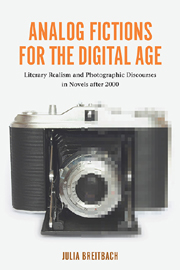 Analog Fictions for the Digital Age
Analog Fictions for the Digital Age Book contents
- Frontmatter
- Contents
- Acknowledgments
- Introduction: Toward a Photographic Reading of Literary Realism
- 1 Photography in the Digital Age: Critical Contexts and the Question of Realism
- 2 This Thing in the Text: Photography, Thing Theory, and the Return to Realism in Literature
- 3 Liminal Realism: Don DeLillo, The Body Artist (2001)
- 4 Domestic Realism: Ali Smith, The Accidental (2005)
- 5 Poetic Realism: Michael Ondaatje, Divisadero (2007)
- 6 Conclusion: The Way We Write Now—A Case for Realism(s)
- Works Cited
- Index
5 - Poetic Realism: Michael Ondaatje, Divisadero (2007)
Published online by Cambridge University Press: 05 April 2013
- Frontmatter
- Contents
- Acknowledgments
- Introduction: Toward a Photographic Reading of Literary Realism
- 1 Photography in the Digital Age: Critical Contexts and the Question of Realism
- 2 This Thing in the Text: Photography, Thing Theory, and the Return to Realism in Literature
- 3 Liminal Realism: Don DeLillo, The Body Artist (2001)
- 4 Domestic Realism: Ali Smith, The Accidental (2005)
- 5 Poetic Realism: Michael Ondaatje, Divisadero (2007)
- 6 Conclusion: The Way We Write Now—A Case for Realism(s)
- Works Cited
- Index
Summary
This study has asked in which ways contemporary fictions refer to and engage the topical remediation of analog and digital photography, and to what literary purposes they might be using this specific discourse. In answer to this question, I have suggested a shared concern with an aesthetics of trust and the extension of belief—from analog to digital, and from the photographic to the literary medium. I have used the precarious yet tenacious truth status of photographic representation—innate to both analog and digital technologies—to elaborate on the idea of a “contingent referentiality” (Klaus Stierstorfer), which distinguishes the semiotics of photography and contemporary literary realism alike (see chapter 2 of this study).
The novels that have been analyzed so far within this conceptual framework have made a rather explicit case of the continuities and differences between analog and digital photographic discourses. Set in the post-Y2K world of omnipresent digital imaging, they have their characters move naturally in a technical universe of digital video cameras (The Accidental) or online video streams (The Body Artist), while simultaneously drawing on the medium's analog tradition and foundational stake in the Real.
- Type
- Chapter
- Information
- Analog Fictions for the Digital AgeLiterary Realism and Photographic Discourses in Novels after 2000, pp. 163 - 205Publisher: Boydell & BrewerPrint publication year: 2012
